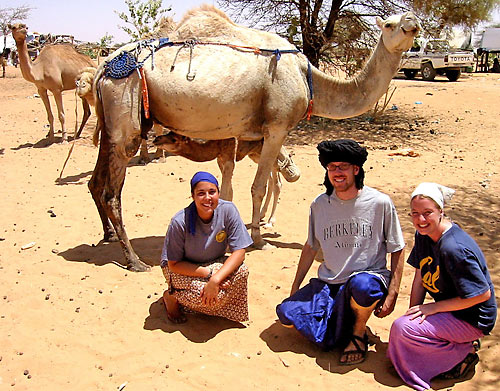Music from A - Z
=== Music From A to Z ===
The world follows a few clean and simple rules. Gravity pushes down. Money is expensive. And Pearl Jam’s debut album “Ten” starts with “Once” and ends with “Release.” You can’t drop a golf ball up, buy a new car for five dollars, or start “Ten” with “Alive” and conclude with “Why Go.” You just can’t!
I was somewhere over the Atlantic ocean when my attractive Air France flight attendant confirmed that the rules had just been broken.
“Excuse me, Madame, what’s the first song on Pearl Jam Ten?” I asked quickly as though it were one long, agitated word.
“Well, I don’t listen to your terrible American music,” she said loudly, and then followed in a whisper, “but everyone knows it’s ‘Once.’”
I pulled my elastic banded sleep mask down over my eyes with a whimper as my self-inflicted punishment was revealed: two years of alphabetized musical hell.
What music to bring to Peace Corps and how to play it is a big decision. Maybe in the olden days porters followed you dragging a harpsichord, but technology has made the decision more complicated. Will it be an mp3 jukebox, mp3/cd player, simple CD player, or a barebones portable cassette player? Not knowing what my site would offer, I took the middle road, copying my 150 or so CDs onto 15 mp3 CDs, which look just like normal CDs but play on computers or special CD players. I thought I was safe.
My flight to Paris began with the mentioned above shock and got worse in a hurry. The Red Hot Chili Pepper’s “Blood Sugar Sex Magic” opened with “Apache Rose Peacock” instead of the badabadabing fade-in of “Power of Equality.” Dave Attell’s comedy album was mangled into 30-odd two minute tracks, completely out of sequence. Albums with numerically titled songs, such as the Beach Boys “409” or John Mayer’s “3x5” started off with that track instead of the legitimate opener.
Now, that might not mean much to casual music fans raised on best-of’s, compilations and bad radio, but to me, albums mean something. WHAT happens WHEN is ordained with no lesser significance than Anna Karenina being flattened by a train, or a sled engraved with the word “Rosebud” burning in a fireplace.
Peace Corps is a tumultuous experience, and every volunteer must have their pacifier. For me, it’s music, and on Day Two my pacifier was dipped in mud and shoved back into my mouth upside-down. But maybe it’s a good lesson in endurance, something for the resume. “I spent two years in the blazing deserts of Africa,” I can brag to employers or graduate schools, “and I adapted to having my favorite comedian say ‘thank you, Goodnight!’ at the end of his first joke.”
I hope you never have to experience this feeling. I have written a short ironic article about an aspect of my life in the Peace Corps; it follows below, and I hope you find it enjoyable.
==== Quotable ===
From New York magazine article on the murder of Forbes Russia editor Paul Klebnikov: “If Paul were alive today,” said Serge Ossorguine, “he would be very disheartened by his murder.”
=== Been on my mind a lot lately ===
Do they know it’s Christmas time at all?
=== Chilling in the Second Hand Economy ===
In the 1990s a middle-class Barcelona family owned a medium-sized refrigerator. They probably never thought twice about it; maybe it preserved their leftover paella and chilled a bottle of wine before a dinner party. After a good many years, the fridge was deemed less than worthy and sold to second-hand traders, who slipped down the rugged coast of Africa to Nouakchott, Mauritania. Now, $150 later, it’s in my kitchen, cooling ice tea, a can of evaporated milk, and the last slice of a six kilo watermelon. Next to the Air Iberia sticker (from which I base my tenuous Spanish pedigree), we’ve slapped UN Volunteer and HIV/AIDS awareness stickers, and under a camel magnet (thanks Jay!) hangs a comic given to me by my DC roommate and now resident of southern Afghanistan, Joel H. It features two strange looking men sitting at a bar. One says to the other “if you’re going to hum, hum. If you’re gong to drink, drink. But please, stop whatever it is you’re doing now!”
Living in the third world, you grow accustomed to the second life of first world products (do I get an award for that word play?). Mercedes with a quarter million miles are eased out of Europe with the help of environmental regulations. Used clothing stores run a brisk trade, outfitting Kiffa residents in shirts saying things like “Pray Hard!” (not kidding!) and “Albany City School District.” Consumer goods near or past expiration dates crowd the shelves of epiceries, leaving traces of developed country liquidation sales.
For every product that seems logically designed for the Mauritanian market – my favorite being Rose full cream milk a English/Arabic logo and tetra-pak for years of un-refrigerated freshness – you find two that seem to have just shown up uninvited.
But they find a home eventually, or it moves on. It’s a ragged, motley, under-the-radar brand of capitalism, but to the folks here it’s as normal as cous-cous. (do I get penalized for that ending?)
=== Up To The Minute PCVmeter ===
Name: Luke Filose
Currently Reading: KGB: The Secret Work of Soviet Agents, by John Barron
Just Read: The Possessed, by Fyodor Dostoyevsky
Coldest morning so far in Kiffa: 61 degrees Fahrenheit
Favorite Gadget: Solar camping shower
Favorite Food: Jello Instant Pudding (not available in stores)
Favorite Song: Billy Goat by Nick van Brunt
Favorite Album: “Talking Timbuktu,” Ry Cooder with Ali Farka Toure
Most satisfying moment: Hitting fast running goat with a rock at seven meters

